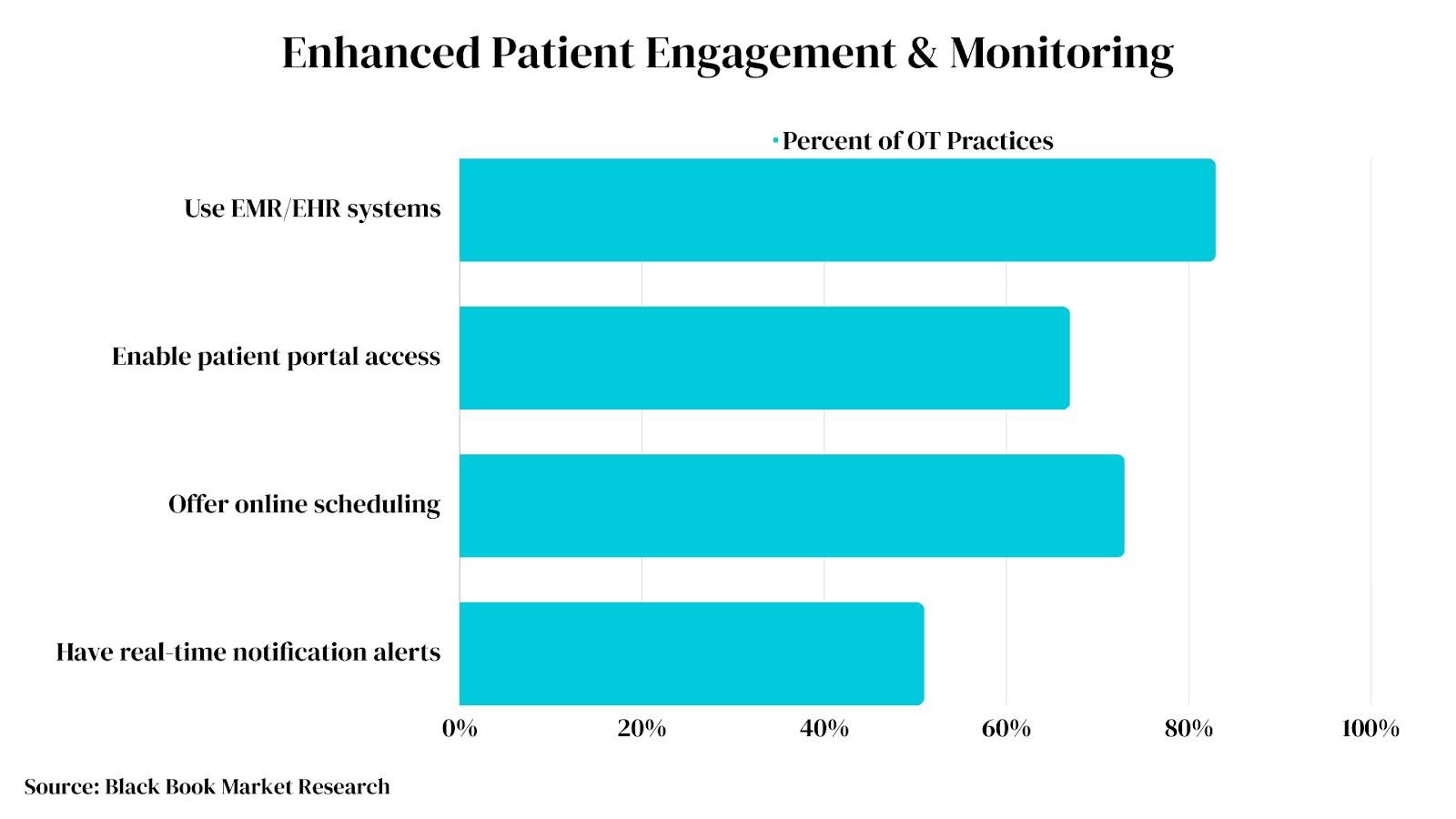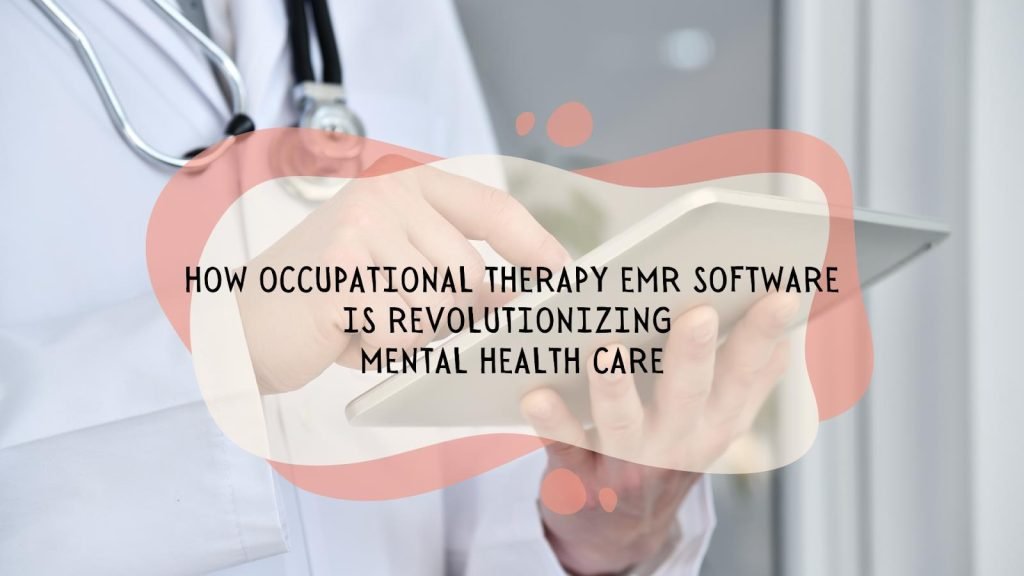Mental health issues are very common. Mental health issues affect many people; approximately 4% of American adults deal with serious conditions such as schizophrenia, bipolar disorder, or severe depression. When facing such challenges, accessing treatment and services poses another difficulty to overcome.
Many individuals in need find the process of navigating the system confusing and intimidating.
Specialized therapy software aims to address this by empowering patients with clear information to make informed choices. In this article, let’s explore how occupational therapy EMR software is revolutionizing mental health care.
Table of Contents
Enhanced Patient Engagement and Monitoring
Using occupational therapy EMR software makes it much easier for occupational therapists to keep patients engaged outside of appointments. This leads to better mental health results over time.
The key benefits are:
- Personalized treatment plans matching what each patient cares about
- Easy access to notes or forms between visits
- Tools to track moods or issues day-by-day
- Secure video chat for appointments from home
Studies have found that when patients actively participate between sessions, they tend to recover faster and maintain their progress for longer.
Customized Treatment Plans
The EMR system allows therapists to create customized treatment plans that are tailored to patient’s individual needs and goals. They can track progress on emotional, social, and cognitive issues – whatever matters most to the patient. When people feel “seen” in therapy, they engage more in getting better.
Suppose Pablo wants to improve his ability to socialize without excessive anxiety. His therapist can set up a customized program focused on positive social interactions. The software makes it simple to record Pablo’s progress each week on his personal goals.
Accessibility Between Visits
Patients can access therapy homework or notes from a personal online portal 24/7. This makes it easy to stick with treatments between appointments.
Patients, like Madison, can log in to download mindfulness audio exercises. She can upload observations from trying them out at home. Having unlimited access keeps her on track even when life gets busy.
Virtual Care Options
The system also allows secure video calls for virtual therapy sessions. This feature has made treatment possible for many struggling with leaving home.
For example, Franco used to miss appointments completely on days his anxiety flared up. Now when he’s feeling too overwhelmed to come in, he can still connect with his occupational therapist by video chat. Keeping up regular interactions remotely has helped stabilize his mental health.

Data-Driven Treatment Planning
Occupational therapy EMR software unlocks a treasure trove of patient data that therapists can use to customize highly effective, personalized care plans.
By aggregating real-world evidence across the system, therapists can:
- Detect patterns related to symptom triggers or early warning signs of issues
- Compare outcomes between patient subgroups to pinpoint targeted treatment adjustments
- Monitor medication effects on sleep quality, motivation levels, concentration, and other functional mental health goals
- Predict which interventions might work best for an individual based on how they’ve responded previously
Finding Insights in the Data
Combining data from thousands of patients reveals trends about what works well or is not so great in mental health treatment plans. Analyzing similarities across subgroups allows therapies to be calibrated more precisely.
For example, a therapist might discover patients who begin a new job while tapering off Zoloft often experience increased anxiety after 2-3 weeks. That insight can guide proactive planning.
Integrating Medication Effects
The EMR software links therapists’ notes on prescription medication impacts to outcomes. Documenting how meds influence motivation, cognitive function, sleep quality, and other domains provides intel on whether and how they help patients reach occupational goals.
Let’s say a patient taking new antidepressants shows lower motivation scores. Having this feedback loop allows their doctor to adjust dosage over time while monitoring improvements in daily function.
By tapping into aggregated case evidence, therapists can make wise decisions to create tailored treatment plans. Patients benefit from care customized to their needs and documented responses. It’s an insightful win-win for more effective mental healthcare!
Interdisciplinary Collaboration and Communication
Occupational therapy EMR software significantly simplifies collaboration among care providers. This leads to patients getting better, more well-rounded care.
Seamless Coordination
The system allows patient info to be shared securely across their whole care crew – from therapists and psychologists to regular doctors and coaches.
Specialized features help streamline teamwork:
- Automatic alerts when changes happen
- Shared calendars to schedule visits
- Quick e-referrals across specialties
- Central progress notes and treatment goals
United Care Team
All members of a patient’s support squad access the same system. This way the occupational therapist, psychiatrist, primary doctor, life coach, and anyone else stay on the same page. They get a complete picture to coordinate plans.
Streamlined Logistics
Scheduling is synced up across disciplines to simplify things for better collaboration. Secure chat helps specialists consult or refer patients easily. And billing flows through the central system.
Smooth coordination gives therapists more quality time to invest in working directly with patients. And people with multiple conditions don’t have to repeat their story as much across isolated specialists. It’s a win-win!
FAQs
What are the main benefits of occupational therapy EMR software?
There are three major benefits:
- Enhanced patient engagement and monitoring
- Data-driven treatment planning
- Streamlined coordination between different care providers
Together this technology empowers better mental health management for every patient.
Does this software replace therapists?
No. Occupational therapy EMR software assists therapists by automating administrative tasks. This gives them more time to work directly with patients. However, the thoughtful expertise of a skilled occupational therapist is irreplaceable.
What makes this software specialized for mental healthcare?
These systems collect data specific to mental health like mood regulation capacity and social interaction abilities. The workflows and tools focus on symptoms and experiences common in mental health disorders. This specialized approach is what differentiates this EMR software.
Final Thoughts
Occupational therapy EMR software marks a major evolution in mental health treatment. By tapping technology to enhance patient engagement, data analysis, and care coordination, outcomes can be greatly improved. This specialized systems approach empowers both patients and providers with the tools and information they need to succeed.
As adoption spreads, clinicians gain the capacity to manage mental health issues with new effectiveness at scale. The future looks brighter for those facing emotional, social, and cognitive health challenges.
